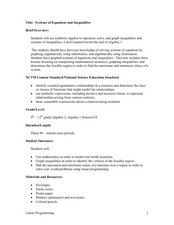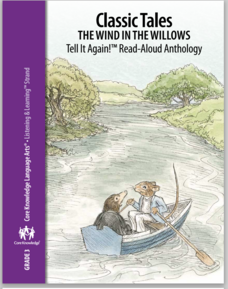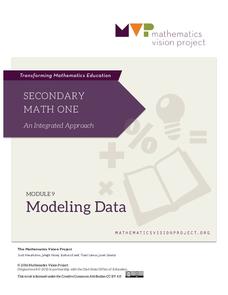Conneticut Department of Education
Personal Finance Project Resource Book
Balancing a budget, paying taxes, and buying a home may feel out of reach for your high schoolers, but in their adult years they will thank you for the early tips. A set of five lessons integrates applicable money math activities with...
National Science Teachers Association
Hop into Action
Young scientists find out what makes amphibians such unique and interesting animals in this simple life science lesson. After looking at pictures and discussing the characteristics of amphibians, learners complete a series of three Venn...
National Security Agency
Systems of Equations and Inequalities
High school classes can use manipulatives too! Offer hands-on, interactive lessons that venture away from the typical day in your algebra class. Young mathematicians will be involved in collaborative learning, visual representations, and...
Meadows Center for Preventing Educational Risk, University of Texas at Austin
Lesson 5 - R-Controlled Syllables
Put on your pirate hat and get ready to teach r-controlled syllables. Learners practice using words that contain ar, or, er, ir, and ur. Instructors model how to decode words to isolate vowel teams, as well as combine r-controlled sounds...
Federal Reserve Bank
It's Your Paycheck
Beyond reading and arithmetic, one of the most important skills for graduating seniors to have is fiscal literacy and responsibility. Start them on the right financial track with nine lessons that focus on a variety of important personal...
Core Knowledge Foundation
Maya, Aztec, and Inca Civilizations
A 10-lesson unit explores the Maya, Aztec, and Inca civilizations. Over the course of two weeks, scholars read nonfiction excerpts, discuss their findings, and complete activities. An assessment equipped with multiple choice and matching...
Core Knowledge Foundation
Kindergarten Skills Unit 9
This unit explores uppercase letters and tricky high-frequency words. Over 23 lessons, scholars review decodable and high-frequency words, examine and practice writing uppercase letters, and work with a new tricky high-frequency word....
Core Knowledge Foundation
First Grade Skills Unit 5
Twenty-two lessons make up a unit that focuses on first-grade skills. Scholars examine spelling alternatives—their rules and patterns, practice tricky spelling and high-frequency words, explore plural nouns and sentences, read a...
Core Knowledge Foundation
Kindergarten Skills Unit 4
Fifteen lessons make up a unit that focuses on letter-sound correspondence. Beginning readers examine letters and their sounds. Scholars complete a review, an engaging activity, watch teacher modeling, and practice concepts. Lessons are...
Core Knowledge Foundation
Third Grade Skills Unit 4: Stories of Ancient Rome
A unit covering stories of Ancient Rome examines spelling rules, suffixes, verbs, quotation marks, writing, and dictionary skills. Lessons follow a similar routine; reading, skills practice, and extension activities, followed by...
Core Knowledge Foundation
Classic Tales: The Wind in the Willows Tell It Again!™ Read-Aloud Anthology
A read-aloud anthology boosts reading comprehension with classic tales. Thirteen lessons introduce and present a reading; pupils discuss the reading, then participate in extension activities. Take-home materials are available for most...
Core Knowledge Foundation
Kindergarten Skills Unit 6
Throughout 15 lessons, scholars explore four and five-sound and rhyming words, closely examining initial and final consonant sounds, and begin reading the text independently. Each lesson follows a similar routine; an introduction to...
Core Knowledge Foundation
Kindergarten Skills Unit 7
A unit consists of seventeen lessons that examine six new consonant digraphs. Lessons review past concepts, introduce sounds and spelling, and offer differentiated instruction in small groups. Learners begin reading a decodable story and...
Core Knowledge Foundation
First Grade Skills Unit 7
The last unit in the series by Core Knowledge focuses on alternative spellings, nouns, verbs, conjunctions, subject-verb agreement, using commas in a series, constructing sentences, and following the writing process while writing...
Core Knowledge Foundation
Animals and Habitats Tell It Again!™ Read-Aloud Anthology
A read-aloud anthology explores various habitats and the animals that inhabit them, from the Artic to the desert, the forest, and bodies of water. First graders listen to and discuss texts and complete word work. Each lesson offers...
Core Knowledge Foundation
Frontier Explorers Tell It Again!™ Read-Aloud Anthology
The last read-aloud anthology in the series showcases frontier explorers. First graders listen to texts about Daniel Boone, crossing the Appalacian Mountains, Lewis and Clark, dangers on the prairie, and more. After reading, pupils...
Core Knowledge Foundation
Greek Myths Tell It Again!™ Read-Aloud Anthology
A unity covers Greek mythology through read-alouds and activities. Fourteen lessons share a new story that pupils discuss, then complete word work and extension opportunities. Topics include the gods of Mount Olympus, Hercules, and more.
Core Knowledge Foundation
Taking Care of the Earth Tell It Again!™ Read-Aloud Anthology
A read-aloud anthology closely examines human impact on the Earth while boosting reading comprehension skills. Through stories, scholars examine the concepts of natural resources, pollution, garbage, and recycling and brainstorm ways to...
Core Knowledge Foundation
Kindergarten Skills Unit 5
A unit designed for kindergarteners builds letter-sound correspondence in preparation for reading. Over four weeks, young scholars build proficiency in recognizing and matching the sound of 9 letters. They take that knowledge to read a...
Core Knowledge Foundation
Different Lands, Similar Stories Tell It Again!™ Read-Aloud Anthology
A read-aloud anthology highlights how one story differs depending on where it comes from. Scholars listen carefully to familiar and new stories, participate in discussions, and complete word work practice. Extensions for each lesson...
Core Knowledge Foundation
Unit 2: Early American Civilizations
Fifth graders explore early American civilizations in a four-week ELA unit. Every lesson offers an opportunity to read and discuss a selected passage followed by word work that covers vocabulary, grammar, and morphology. Learners write...
Bully Free Systems
Bully Free Lesson Plans—Seventh Grade
Having a hard time defining bullying with your seventh graders? Discuss the different types of behavior one would see in a bullying situation with a series of lessons, worksheets, and group activities.
University of New Mexico
Educating Culturally and Linguistically Diverse Students
Three mini units make up one large unit designed to explore multiculturalism and encourage cultural identity. Each lesson sparks thoughtful discussion, critical thinking, and are equipped with activities and assignments geared to...
Mathematics Vision Project
Modeling Data
Is there a better way to display data to analyze it? Pupils represent data in a variety of ways using number lines, coordinate graphs, and tables. They determine that certain displays work with different types of data and use two-way...

























